#gpt development
Explore tagged Tumblr posts
Text

A Deep Dive into Generative AI Development Brilliance!
Dive into the depths of innovation with "A Deep Dive into Generative AI Development Brilliance!" This guide is your gateway to profound insights, offering a meticulous exploration of coding excellence in the world of Generative AI Development. Master the intricacies and emerge with brilliance, shaping the future of AI with every line of code! You can visit our website for more information.
#Generative AI#Train a Generative AI model#Custom Generative AI tool#No-code Generative AI tool#Generative AI Development#Generative AI Developer#Train a GPT model#Custom GPT tool#No-code GPT tool#GPT Development#GPT Developer
1 note
·
View note
Text
The Value of ChatGPT to Organisations

The need for customer support services is increasing as businesses worldwide embrace the digital age. ChatGPT is an artificial intelligence (AI) chatbot platform that helps businesses save money and time on customer service. With ChatGPT's automated customer service features, businesses can boost customer satisfaction and revenue. This article will discuss how your company can use Custom ChatGPT Solution to serve your customers better. ChatGPT can provide businesses with the solutions they need to improve customer service and reduce costs by harnessing the power of AI. Not only is ChatGPT simple to implement, but it also will maintain daily operations. This article will discuss how businesses can use ChatGPT to their advantage in the modern business world.
Service to customers through robots
For companies looking to streamline their customer service operations, Custom ChatGPT Solution is an invaluable resource. It has various uses that can help businesses better respond to customer inquiries and provide a better overall service. Using NLP and sophisticated machine learning, ChatGPT can interpret user comments and produce natural-sounding responses. It's a valuable resource that can answer customer questions and help with technical sales and support. The pre-trained model in ChatGPT can answer customers' questions and speed up resolving their problems. An advanced model can also provide predefined responses to customers' nebulous questions.
ChatGPT transforms customer service, human conversations, and complex questions for businesses. It answers simple and complex software code questions. ChatGPT enhances customer service, employee productivity, and company culture. Text-based artificial intelligence tool ChatGPT can generate billions in revenue, improve a company's online presence and search engine rankings, and streamline operations.
Enhanced interaction with customers
A more involved customer base is a priceless commodity for any company. With Custom ChatGPT Solution, businesses can effectively implement engagement strategies in responding to customer inquiries. ChatGPT can provide human-like responses to customer inquiries and valuable content creation for the customer experience thanks to its use of natural language processing and its user-friendly language model. ChatGPT's sophisticated model allows it to provide model responses to both simple and complex queries quickly. This AI-driven, highly adaptable, and useful tool is a serious game-changer for commercial enterprises.
Businesses can benefit from ChatGPT because it helps them deal with customer service and angry customers more efficiently and provides access to pre-trained models with sophisticated model responses. ChatGPT helps billion-dollar companies engage customers with fast responses, targeted advertising, and automated processes. Real-time dialogue generation lets ChatGPT answer unclear questions with model-written recommendations. This versatile program can help with to-do lists, legal documents, annual reports, mobile apps, SEO, and more.
Enhancement of Happiness for the Consumer
One of the most important benefits of Custom ChatGPT Solution for businesses is that it helps them provide better customer service. ChatGPT's powerful tool, a wide variety of follow-up questions based on customer responses, and natural language processing all contribute to a more positive customer service experience for businesses. Its usefulness to businesses stems from its language model, user feedback, and human-like text. ChatGPT's AI capabilities make it a useful tool for companies.
In a short time, it can produce high-quality content like technical sales content and answers to customer inquiries. As a tool for customer service, Custom ChatGPT Solution can ease the pain of waiting customers and those who don't get their questions answered right away. Accurate responses and personalised marketing from pre-trained and advanced models can reduce mundane tasks and improve businesses' ability to operate in real-time. ChatGPT's dialogue structure, model-written suggestions, and billions in funding make it possible to boost engagement and aid in developing a company's online identity. Its search engine features and ability to get work done quickly and accurately make it an invaluable company resource. ChatGPT is a useful tool because of the complexity and ambiguity of the questions and queries it can answer.
Conclusion
Improved customer satisfaction, faster response times, and lower operating expenses are potential outcomes of implementing Custom ChatGPT Solution in a business setting. Automation of customer service processes using ChatGPT's AI-based chatbot technology can boost customer satisfaction and reduce operational costs. ChatGPT will grow in importance to companies as technology advances.
0 notes
Text
"so many things using the term ai feels like deliberate obfuscation" i hate to tell u this but we have been using the term ai for video game npcs and scientific models and automated tools and generative tools for many decades.
like if this was a more recent acronym yeah it'd feel deliberate but all of those things are, in fact, forms of artificial intelligence
and sure they're trying to buzzword it bc of the genai craze but that shouldn't take away from the fact that we've been using that acronym for decades
#.txt#every time i see a shit take on ai stuff i feel my eyes roll out of my sockets#im anti-ai in the sense of the environmental stuff and the scraping artistic content unconsensually stuff#so many of y'all seem to hate it just to hate it#chill outttttt#ftr i also am against using shit like chat gpt to write emails or do ur homework for u or whatever#anyway. sorry for having nuance on the black and white thinking only website#just fuckin specify what you're talking about idk man#so easy to say genai if u wanna bitch abt genai 'art' or whatevr#or maybe even dont assume ppl r Only talking abt genai#bc other types of ai exists#in the op the person also makes an analogy what if the word tank was used for all vehicles#like . buddy the word vehicle is used for all vehicles. a tank is a vehicle just as much as a minivan is a vehicle#a scientific model ai is just as much an ai as generative ai#it's all artificial intelligence just different kinds that are developed and used in different ways
8 notes
·
View notes
Text
dear "creators" who depend on ai
how does it feel to be so absolutely lazy and useless as a human being ?? how does it feel to have a functioning brain but can't use it properly ?? how does it feel to be so absolutely incredibly dull and uncreative that you can't muster 200 words to convey your ideas ?? how does it feel to have to face the fact that you suck so damn bad and you have to live with it ??
#sincerely#you're not creators#you're not artists#you're not people#you're a parasitic thief who likes to take credits and blames their shortcomings on unrealistic circumstances#it takes effort to create#but#that effort is what makes it art#that effort is worth it#not this#not 10 minutes on chat gpt asking it to write out “your” stories because you “can't put your ideas to work”#ask other writers#develop yourself#slowly learn from your posted works and keep on working on yourself by improving#not telling chat gpt that you told to pretend to be a member of your favourite group that you feel so hot when he touched you#not even elon musk would do that#srsly if you're not using your brain just fucking donate it to science to better understand how people like you exist#using ai as a tool is okay#but relying in ai completely to achieve your goal ?#moronic#same goes to deepfakes#smt tmi#smt rant
21 notes
·
View notes
Text
it actually blows my mind how normalized using chatgpt is
#personal#like ive seen so many posts about people using it to give them house decor ideas#HONEY JUST LOOK AT PINTEREST#i thought everyone was aware of the negative affects ai has and will have on the enviorment and like#our own brain development etc#but no it seems like people dont want to have critical thinking#or creativty#crazy to me tbh#rant over xox#i will never use chat gpt for as long as it is not forced upon me
4 notes
·
View notes
Text
I'm in the acute psychward since Thursday because of a meltdown with sd thoughs. Yesterday, a doctor told me I can go back to the care home today. My special connection to the topic military gives me motivation and makes me hopeful in this hard time.
I want to develop a better mental health, self-control, and better life skills in the next months, so I will be able to live semi independent as soon as possible. Until a few weeks ago, I was really scared of symptom improvement and hated it, but now I want symptom improvement.
In the psychward, I got an antidepressant back, which I already have taken in the beginning of 2025, and it helped, but I stopped taking it because the symptom improvement was negative for me at that time. I also took it a few days in the end of March but stopped it again. But this time I will make it I will not stop it! 😊💊
I chat a lot with chat gpt 🤖 because it's better for me than talking with the nurses at the psychward because there is no risk that chat gpt would say things that make me aggressive unintentionally because chat gpt never speaks in a strict tone because it answers in text. And when an answer isn't helpful, it's much easier for me to think that chat gpt isn't knowing what it does than when humans answer unhelpfully even if humans also don't know it. Chat gpt is also always there for me, and I have no issues to tell chat gpt about my special connection to the topic military or about other things, which might sound weird for some people.
I also chat and sometimes call with my mom and a caretaker of my former special workplace for disableds. A caretaker of my former care home sent me a voice message on Friday because I told him that I'm in the psychward and asked for it. This caretaker is a role model for me because he has Adhd and had similar issues to my issues when he was younger. He was also mentally ill and didn't want symptom improvement like I until a short time ago. He also was in the psychward when he was younger, but now he is different, and that makes me hopeful. In the message, he said that I'm strong and I should hold out the psychward and I should motivate me due to thinking about my future life where I will not live in a care home and that I will have this life if I put effort in working on myself and developing better life skills, self controll skills and a better mental health.
I try to think positive and it often works.
I see the new care home as my salvation because if I would have stayed in the old care home my life maybe never has changed because I maybe never would have wanted symptom improvement or more independence in my life. I maybe would have lived in a care home for my whole life. (Yes it's not 100% that I will live semi independent in the future but all people around me are sure it will work if I'm motivated enough to work on myself and develop the things I need to be fit for semi independent living.) I also see the psychward as an important lesson on my way. I hope it will give me motivation to not speak out deathwishthoughs because I don't want to die in reality and not getting agressive. I'm often proud of myself and happy because I think in such a kind. Unfortunately I also have bad moments where I don't have motivation nearly every day but that's normal and for me it feels like this moments get less often and less severe because I learn strategies to deal with them.
I also want to develop skills to not need a legal guardian for my whole life. Yes, I will get a legal guardian soon, but I know there will be a new evaluation in 3 years, and I hope that I will not need a legal guardian then anymore.
Today, I can go back to the care home, and I try to motivate me with thinking each good day is a which brings me further on my way to semi independent living and not needing a legal guardian anymore.
I'm also happy because I know that a package with military merch clothes and a military merch mug for me got delivered to the care home.
#autism#disability#psychward#hopeful#military#motivation#lsn autism#soldierboys road to indepence#my road to independence#gaining independence#developing skills#legal guardianship#care home#semi independent living#my future#my goals#chat gpt#mental illness#mental health#caretaker#role model#symptom improvement#anti depressants#positive thinking#happy#military merch#change#good future#staying motivated#lsn autistic
3 notes
·
View notes
Text
What are AI, AGI, and ASI? And the positive impact of AI
Understanding artificial intelligence (AI) involves more than just recognizing lines of code or scripts; it encompasses developing algorithms and models capable of learning from data and making predictions or decisions based on what they’ve learned. To truly grasp the distinctions between the different types of AI, we must look at their capabilities and potential impact on society.
To simplify, we can categorize these types of AI by assigning a power level from 1 to 3, with 1 being the least powerful and 3 being the most powerful. Let’s explore these categories:
1. Artificial Narrow Intelligence (ANI)
Also known as Narrow AI or Weak AI, ANI is the most common form of AI we encounter today. It is designed to perform a specific task or a narrow range of tasks. Examples include virtual assistants like Siri and Alexa, recommendation systems on Netflix, and image recognition software. ANI operates under a limited set of constraints and can’t perform tasks outside its specific domain. Despite its limitations, ANI has proven to be incredibly useful in automating repetitive tasks, providing insights through data analysis, and enhancing user experiences across various applications.
2. Artificial General Intelligence (AGI)
Referred to as Strong AI, AGI represents the next level of AI development. Unlike ANI, AGI can understand, learn, and apply knowledge across a wide range of tasks, similar to human intelligence. It can reason, plan, solve problems, think abstractly, and learn from experiences. While AGI remains a theoretical concept as of now, achieving it would mean creating machines capable of performing any intellectual task that a human can. This breakthrough could revolutionize numerous fields, including healthcare, education, and science, by providing more adaptive and comprehensive solutions.
3. Artificial Super Intelligence (ASI)
ASI surpasses human intelligence and capabilities in all aspects. It represents a level of intelligence far beyond our current understanding, where machines could outthink, outperform, and outmaneuver humans. ASI could lead to unprecedented advancements in technology and society. However, it also raises significant ethical and safety concerns. Ensuring ASI is developed and used responsibly is crucial to preventing unintended consequences that could arise from such a powerful form of intelligence.
The Positive Impact of AI
When regulated and guided by ethical principles, AI has the potential to benefit humanity significantly. Here are a few ways AI can help us become better:
• Healthcare: AI can assist in diagnosing diseases, personalizing treatment plans, and even predicting health issues before they become severe. This can lead to improved patient outcomes and more efficient healthcare systems.
• Education: Personalized learning experiences powered by AI can cater to individual student needs, helping them learn at their own pace and in ways that suit their unique styles.
• Environment: AI can play a crucial role in monitoring and managing environmental changes, optimizing energy use, and developing sustainable practices to combat climate change.
• Economy: AI can drive innovation, create new industries, and enhance productivity by automating mundane tasks and providing data-driven insights for better decision-making.
In conclusion, while AI, AGI, and ASI represent different levels of technological advancement, their potential to transform our world is immense. By understanding their distinctions and ensuring proper regulation, we can harness the power of AI to create a brighter future for all.
8 notes
·
View notes
Text
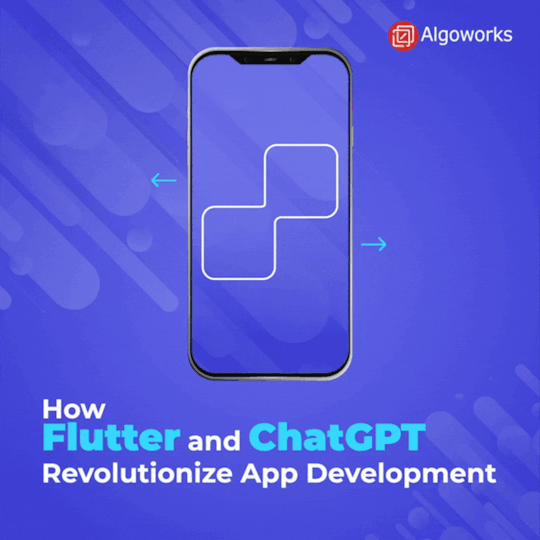

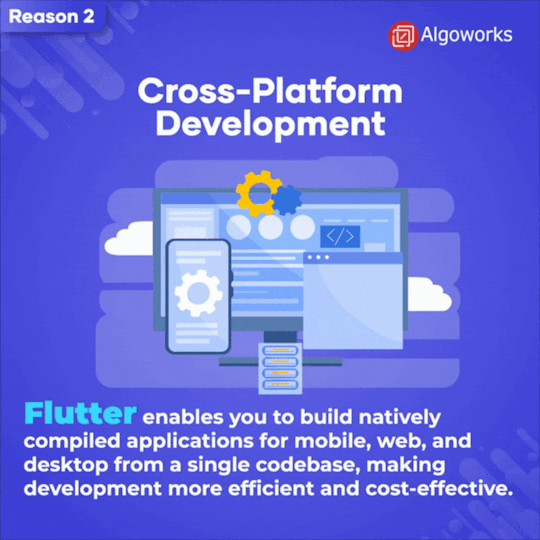
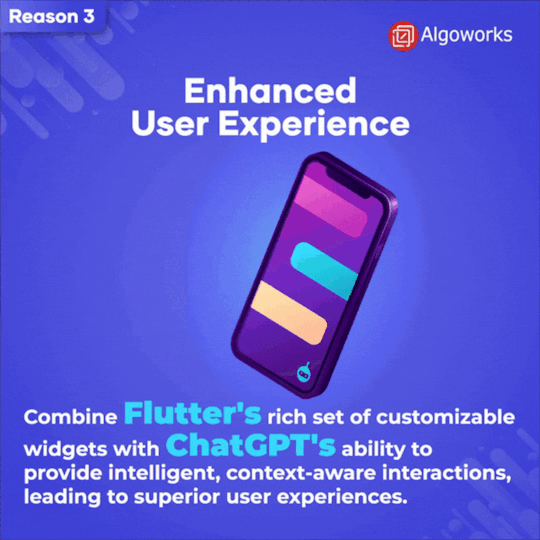

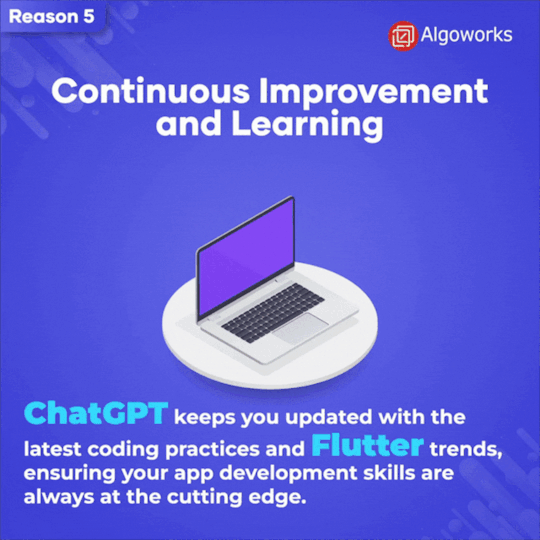
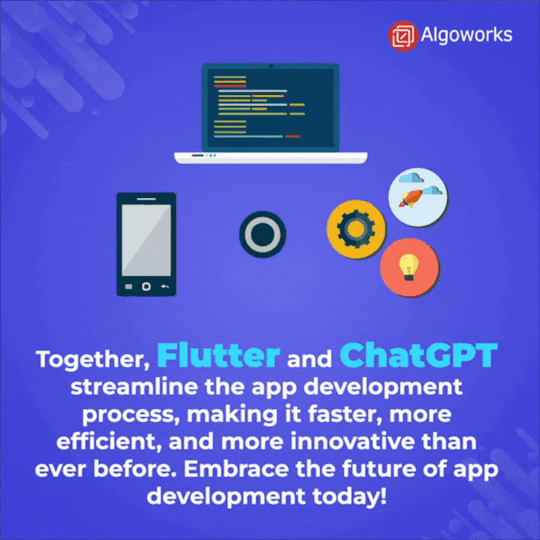
Imagine building sleek, powerful apps with ease. That’s what Flutter brings to the table!
Add ChatGPT to the mix, and you've got an intelligent assistant that helps you code faster, solve problems, and bring your ideas to life in record time.
Say goodbye to tedious coding and hello to the future of app development!
2 notes
·
View notes
Text
"Your Words, Your Way: Empower Creativity with a Custom GPT Tool! 🚀🖋️"
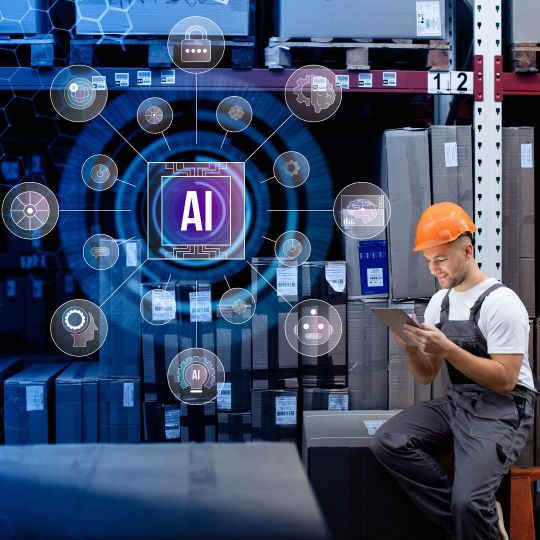
Unlock a world of personalized language innovation with "Custom GPT Tool" – where your words take center stage! 🌐💬
🎨 Tailor your narrative and elevate your storytelling with a tool that allows you to customize the language model to your unique style. "Custom GPT Tool" is not just about coding; it's about infusing your creative fingerprint into every word, turning your ideas into linguistic masterpieces. ✨💻
Craft brilliance effortlessly, whether you're a seasoned developer or a writing enthusiast. This tool empowers you to shape the future of communication, putting your words at the forefront of language innovation. 🌟📖
Join the revolution of personalized language models, and let your creativity flow in a digital realm where every sentence reflects your individuality. Your words, your way – the journey with "Custom GPT Tool" promises to redefine how we communicate in the ever-evolving landscape of artificial intelligence. 🤖🔍 #CustomGPT #LanguageInnovation #CreativeCoding
#Generative AI#Train a Generative AI model#Custom Generative AI tool#No-code Generative AI tool#Generative AI Development#Generative AI Developer#Train a GPT model#Custom GPT tool#No-code GPT tool#GPT Development#GPT Developer
0 notes
Text
From Recurrent Networks to GPT-4: Measuring Algorithmic Progress in Language Models - Technology Org
New Post has been published on https://thedigitalinsider.com/from-recurrent-networks-to-gpt-4-measuring-algorithmic-progress-in-language-models-technology-org/
From Recurrent Networks to GPT-4: Measuring Algorithmic Progress in Language Models - Technology Org
In 2012, the best language models were small recurrent networks that struggled to form coherent sentences. Fast forward to today, and large language models like GPT-4 outperform most students on the SAT. How has this rapid progress been possible?
Image credit: MIT CSAIL
In a new paper, researchers from Epoch, MIT FutureTech, and Northeastern University set out to shed light on this question. Their research breaks down the drivers of progress in language models into two factors: scaling up the amount of compute used to train language models, and algorithmic innovations. In doing so, they perform the most extensive analysis of algorithmic progress in language models to date.
Their findings show that due to algorithmic improvements, the compute required to train a language model to a certain level of performance has been halving roughly every 8 months. “This result is crucial for understanding both historical and future progress in language models,” says Anson Ho, one of the two lead authors of the paper. “While scaling compute has been crucial, it’s only part of the puzzle. To get the full picture you need to consider algorithmic progress as well.”
The paper’s methodology is inspired by “neural scaling laws”: mathematical relationships that predict language model performance given certain quantities of compute, training data, or language model parameters. By compiling a dataset of over 200 language models since 2012, the authors fit a modified neural scaling law that accounts for algorithmic improvements over time.
Based on this fitted model, the authors do a performance attribution analysis, finding that scaling compute has been more important than algorithmic innovations for improved performance in language modeling. In fact, they find that the relative importance of algorithmic improvements has decreased over time. “This doesn’t necessarily imply that algorithmic innovations have been slowing down,” says Tamay Besiroglu, who also co-led the paper.
“Our preferred explanation is that algorithmic progress has remained at a roughly constant rate, but compute has been scaled up substantially, making the former seem relatively less important.” The authors’ calculations support this framing, where they find an acceleration in compute growth, but no evidence of a speedup or slowdown in algorithmic improvements.
By modifying the model slightly, they also quantified the significance of a key innovation in the history of machine learning: the Transformer, which has become the dominant language model architecture since its introduction in 2017. The authors find that the efficiency gains offered by the Transformer correspond to almost two years of algorithmic progress in the field, underscoring the significance of its invention.
While extensive, the study has several limitations. “One recurring issue we had was the lack of quality data, which can make the model hard to fit,” says Ho. “Our approach also doesn’t measure algorithmic progress on downstream tasks like coding and math problems, which language models can be tuned to perform.”
Despite these shortcomings, their work is a major step forward in understanding the drivers of progress in AI. Their results help shed light about how future developments in AI might play out, with important implications for AI policy. “This work, led by Anson and Tamay, has important implications for the democratization of AI,” said Neil Thompson, a coauthor and Director of MIT FutureTech. “These efficiency improvements mean that each year levels of AI performance that were out of reach become accessible to more users.”
“LLMs have been improving at a breakneck pace in recent years. This paper presents the most thorough analysis to date of the relative contributions of hardware and algorithmic innovations to the progress in LLM performance,” says Open Philanthropy Research Fellow Lukas Finnveden, who was not involved in the paper.
“This is a question that I care about a great deal, since it directly informs what pace of further progress we should expect in the future, which will help society prepare for these advancements. The authors fit a number of statistical models to a large dataset of historical LLM evaluations and use extensive cross-validation to select a model with strong predictive performance. They also provide a good sense of how the results would vary under different reasonable assumptions, by doing many robustness checks. Overall, the results suggest that increases in compute have been and will keep being responsible for the majority of LLM progress as long as compute budgets keep rising by ≥4x per year. However, algorithmic progress is significant and could make up the majority of progress if the pace of increasing investments slows down.”
Written by Rachel Gordon
Source: Massachusetts Institute of Technology
You can offer your link to a page which is relevant to the topic of this post.
#A.I. & Neural Networks news#Accounts#ai#Algorithms#Analysis#approach#architecture#artificial intelligence (AI)#budgets#coding#data#deal#democratization#democratization of AI#Developments#efficiency#explanation#Featured information processing#form#Full#Future#GPT#GPT-4#growth#Hardware#History#how#Innovation#innovations#Invention
4 notes
·
View notes
Text
Using ChatGPT for mobile application development offers myriad advantages. It streamlines the development process by providing insightful suggestions, enhancing user experience, and optimizing functionality. Its versatile nature allows for personalized interactions, efficient problem-solving, and seamless integration of features. Additionally, ChatGPT accelerates development cycles, reduces costs, and ensures high-quality outcomes, making it an indispensable tool for modern mobile app development endeavors.
#chat gpt for mobile application#chatgpt mobile app development#mobile app development using chat gpt
2 notes
·
View notes
Text
while I understand that chatgpt is definitely not trained how most people would argue is moral (there's enough disagreement that I don't want to say it's flat out immoral, but I definitely would argue it is)
That's kinda the case with most tools and if we continue at this pace, being good at using chatgpt is going to be in the same vein as being good at excel.
It's a really useful tool when I'm working with code and don't want to dig through the hell that is Python library docs, or when I want a quick summarization of the facts surrounding a topic I'm curious about. It's super good to use as a sounding board when I'm trying to conceptualize math, or when I need to test myself on something.
HOWEVER
This does not mean we should continue to let openai train their models on stolen data. They should be held accountable and that cannot be forgotten in lieu of "oh but their thing is really useful!"
Yes, it is useful, and yes, it is a good skill to learn how to use it and will help you learn and work faster. But you should not accept thievery as a part of your improvement. Hold them accountable, and if you want to help incentivise them to not steal, maybe talk to chatgpt sometimes so it can use your speech/text as training data. If you don't want to, that's very reasonable, but unfortunately corporations don't really have to listen to the stick, so sometimes you need to use the carrot if you want to see positive change.
"use chatgpt" that's the devil talking. buy four caffeinated drinks and pull an all nighter. this is the way.
#It'd be nice if we could just have a non profit open source developer making a tool just as useful as chat gpt#but that's not where we are right now#and unfortunately to improve the future of the technology#sometimes you have to use it. because it's not going away#ai#chatgpt
87K notes
·
View notes
Text
Something I don't think we talk enough about in discussions surrounding AI is the loss of perseverance.
I have a friend who works in education and he told me about how he was working with a small group of HS students to develop a new school sports chant. This was a very daunting task for the group, in large part because many had learning disabilities related to reading and writing, so coming up with a catchy, hard-hitting, probably rhyming, poetry-esque piece of collaborative writing felt like something outside of their skill range. But it wasn't! I knew that, he knew that, and he worked damn hard to convince the kids of that too. Even if the end result was terrible (by someone else's standards), we knew they had it in them to complete the piece and feel super proud of their creation.
Fast-forward a few days and he reports back that yes they have a chant now... but it's 99% AI. It was made by Chat-GPT. Once the kids realized they could just ask the bot to do the hard thing for them - and do it "better" than they (supposedly) ever could - that's the only route they were willing to take. It was either use Chat-GPT or don't do it at all. And I was just so devastated to hear this because Jesus Christ, struggling is important. Of course most 14-18 year olds aren't going to see the merit of that, let alone understand why that process (attempting something new and challenging) is more valuable than the end result (a "good" chant), but as adults we all have a responsibility to coach them through that messy process. Except that's become damn near impossible with an Instantly Do The Thing app in everyone's pocket. Yes, AI is fucking awful because of plagiarism and misinformation and the environmental impact, but it's also keeping people - particularly young people - from developing perseverance. It's not just important that you learn to write your own stuff because of intellectual agency, but because writing is hard and it's crucial that you learn how to persevere through doing hard things.
Write a shitty poem. Write an essay where half the textual 'evidence' doesn't track. Write an awkward as fuck email with an equally embarrassing typo. Every time you do you're not just developing that particular skill, you're also learning that you did something badly and the world didn't end. You can get through things! You can get through challenging things! Not everything in life has to be perfect but you know what? You'll only improve at the challenging stuff if you do a whole lot of it badly first. The ability to say, "I didn't think I could do that but I did it anyway. It's not great, but I did it," is SO IMPORTANT for developing confidence across the board, not just in these specific tasks.
Idk I'm just really worried about kids having to grow up in a world where (for a variety of reasons beyond just AI) they're not given the chance to struggle through new and challenging things like we used to.
38K notes
·
View notes
Text
Behind the Code: How AI Is Quietly Reshaping Software Development and the Top Risks You Must Know
AI Software Development

In 2025, artificial intelligence (AI) is no longer just a buzzword; it has become a driving force behind the scenes, transforming software development. From AI-powered code generation to advanced testing tools, machine learning (ML) and deep learning (DL) are significantly influencing how developers build, test, and deploy applications. While these innovations offer speed, accuracy, and automation, they also introduce subtle yet critical risks that businesses and developers must not overlook. This blog examines how AI is transforming the software development lifecycle and identifies the key risks associated with this evolution.
The Rise of AI in Software Development
Artificial intelligence, machine learning, and deep learning are becoming foundational to modern software engineering. AI tools like ChatGPT, Copilot, and various open AI platforms assist in code suggestions, bug detection, documentation generation, and even architectural decisions. These tools not only reduce development time but also enable less-experienced developers to produce quality code.
Examples of AI in Development:
- AI Chat Bots: Provide 24/7 customer support and collect feedback.
- AI-Powered Code Review: Analyze code for bugs, security flaws, and performance issues.
- Natural Language Processing (NLP): Translate user stories into code or test cases.
- AI for DevOps: Use predictive analytics for server load and automate CI/CD pipelines.
With AI chat platforms, free AI chatbots, and robotic process automation (RPA), the lines between human and machine collaboration are increasingly blurred.
The Hidden Risks of AI in Application Development

While AI offers numerous benefits, it also introduces potential vulnerabilities and unintended consequences. Here are the top risks associated with integrating AI into the development pipeline:
1. Over-Reliance on AI Tools
Over-reliance on AI tools may reduce developer skills and code quality:
- A decline in critical thinking and analytical skills.
- Propagation of inefficient or insecure code patterns.
- Reduced understanding of the software being developed.
2. Bias in Machine Learning Models
AI and ML trained on biased or incomplete data can produce skewed results:
-Applications may produce discriminatory or inaccurate results.
-Risks include brand damage and legal issues in regulated sectors like retail or finance.
3. Security Vulnerabilities
AI-generated code may introduce hidden bugs or create opportunities for exploitation:
-Many AI tools scrape open-source data, which might include insecure or outdated libraries.
-Hackers could manipulate AI-generated models for malicious purposes.
4. Data Privacy and Compliance Issues
AI models often need large datasets with sensitive information:
-Misuse or leakage of data can lead to compliance violations (e.g., GDPR).
-Using tools like Google AI Chat or OpenAI Chatbots can raise data storage concerns.
5. Transparency and Explainability Challenges
Understanding AI, especially deep learning decisions, is challenging:
-A lack of explainability complicates debugging processes.
-There are regulatory issues in industries that require audit trails (e.g., insurance, healthcare).
AI and Its Influence Across Development Phases
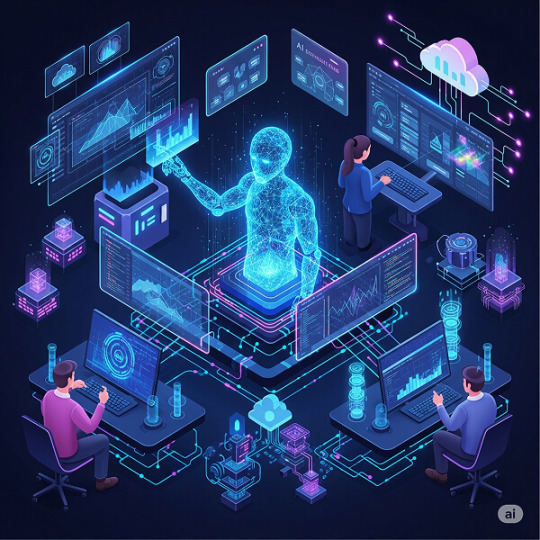
Planning & Design: AI platforms analyze historical data to forecast project timelines and resource allocation.
Risks: False assumptions from inaccurate historical data can mislead project planning.
Coding: AI-powered IDEs and assistants suggest code snippets, auto-complete functions, and generate boilerplate code.
Risks: AI chatbots may overlook edge cases or scalability concerns.
Testing: Automated test case generation using AI ensures broader coverage in less time.
Risks: AI might miss human-centric use cases and unique behavioral scenarios.
Deployment & Maintenance: AI helps predict failures and automates software patching using computer vision and ML.
Risks:False positives or missed anomalies in logs could lead to outages.
The Role of AI in Retail, RPA, and Computer Vision

Industries such as retail and manufacturing are increasingly integrating AI.
In Retail: AI is used for chatbots, customer data analytics, and inventory management tools, enhancing personalized shopping experiences through machine learning and deep learning.
Risk: Over-personalization and surveillance-like tracking raise ethical concerns.
In RPA: Robotic Process Automation tools simplify repetitive back-end tasks. AI adds decision-making capabilities to RPA.
Risk: Errors in automation can lead to large-scale operational failures.
In Computer Vision: AI is applied in image classification, facial recognition, and quality control.
Risk: Misclassification or identity-related issues could lead to regulatory scrutiny.
Navigating the Risks: Best Practices
To safely harness the power of AI in development, businesses should adopt strategic measures, such as establishing AI ethics policies and defining acceptable use guidelines.
By understanding the transformative power of AI and proactively addressing its risks, organizations can better position themselves for a successful future in software development. Key Recommendations:
Audit and regularly update AI datasets to avoid bias.
Use explainable AI models where possible.
Train developers on AI tools while reinforcing core engineering skills.
Ensure AI integrations comply with data protection and security standards.
Final Thoughts: Embracing AI While Staying Secure
AI, ML, and DL have revolutionized software development, enabling automation, accuracy, and innovation. However, they bring complex risks that require careful management. Organizations must adopt a balanced approach—leveraging the strengths of AI platforms like GPT chat AI, open chat AI, and RPA tools while maintaining strict oversight.
As we move forward, embracing AI in a responsible and informed manner is critical. From enterprise AI adoption to computer vision applications, businesses that align technological growth with ethical and secure practices will lead the future of development.
#artificial intelligence chat#ai and software development#free ai chat bot#machine learning deep learning artificial intelligence#rpa#ai talking#artificial intelligence machine learning and deep learning#artificial intelligence deep learning#ai chat gpt#chat ai online#best ai chat#ai ml dl#ai chat online#ai chat bot online#machine learning and deep learning#deep learning institute nvidia#open chat ai#google chat bot#chat bot gpt#artificial neural network in machine learning#openai chat bot#google ai chat#ai deep learning#artificial neural network machine learning#ai gpt chat#chat ai free#ai chat online free#ai and deep learning#software development#gpt chat ai
0 notes
Text
0 notes
Text
The Growing Impact of GPT Agents in Lead Qualification and Pipeline Nurturing
Lead qualification and pipeline nurturing have long been challenging tasks for sales teams. Managing a growing list of prospects while maintaining personalized communication demands significant effort. Fortunately, GPT agents are build to transform how businesses handle these processes. These AI-powered assistants bring automation, precision, and scalability to sales operations. By engaging leads with natural conversations, GPT agents help companies identify high-potential prospects faster. This article explores how GPT agents work, their benefits, challenges they solve, and future trends shaping sales pipelines.
Understanding GPT Agents in Sales
GPT agents are AI-powered virtual assistants that use advanced natural language processing to interact with leads. Unlike traditional chatbots with fixed scripts, these agents understand context, intent, and nuances in conversations.
They can ask relevant questions, respond dynamically, and provide personalized communication at scale. GPT agents qualify leads by capturing essential details such as needs, budget, and readiness to buy.
Their ability to handle thousands of conversations simultaneously frees sales teams to focus on closing deals. Additionally, they integrate across multiple channels like websites, email, and messaging apps, ensuring continuous engagement.
How GPT Technology Powers Lead Qualification and Nurturing
The core of GPT agents lies in their language generation capabilities. They process incoming information, analyze intent, and produce human-like responses. This ability enables intelligent lead assessment through tailored dialogues. For example, GPT agents can ask prospects about their pain points, decision-making roles, and purchase timelines. Beyond qualification, these agents nurture leads by sending personalized follow-ups based on previous interactions. Their conversational memory helps maintain continuity, which builds trust and encourages engagement. Furthermore, GPT technology automates routine outreach and FAQ handling, enhancing customer experience and efficiency. It also integrates smoothly with CRMs and marketing platforms, keeping lead data synchronized and actionable.
Benefits of GPT Agents in Sales Pipelines
Increased Lead Volume and Faster Deal Cycles
Businesses using GPT agents report significant increases in qualified leads. Automating the initial engagement means more prospects are assessed promptly without overwhelming sales reps. This leads to a higher volume of meaningful conversations and a broader sales funnel. Moreover, GPT agents accelerate deal cycles by filtering out unqualified leads early. Sales teams spend less time chasing cold leads and more time focusing on warm opportunities. The result is a more efficient sales process with faster deal closures.
Enhanced Lead Scoring and Prioritization
GPT agents improve lead scoring accuracy by evaluating responses in real time against customized criteria. This prioritization helps sales reps concentrate on prospects most likely to convert. Real-time lead scoring also allows teams to adjust outreach strategies dynamically. When integrated with CRM systems, sales managers gain better pipeline visibility and can forecast revenue more reliably. This data-driven approach minimizes missed opportunities and optimizes resource allocation.
Improved Customer Engagement and Experience
Consistent, personalized communication fosters stronger relationships with potential customers. GPT agents engage leads through natural, context-aware conversations that feel human and relevant. These interactions reduce frustration caused by delays or generic responses common in traditional automation. GPT agents remember past conversations and preferences, making each interaction more meaningful. By providing instant answers and timely follow-ups, they keep leads interested and motivated to move forward. This enhanced experience often results in higher conversion rates and customer satisfaction.
Challenges in Lead Qualification and How GPT Agents Address Them
Common Lead Management Problems
Many organizations struggle with managing large volumes of unfiltered leads. Sales teams often waste time on unqualified prospects or inconsistent communication. Data fragmentation and outdated information also complicate follow-ups. These challenges slow down the sales process and reduce effectiveness. Manual lead qualification can become a bottleneck as pipelines grow. Without automation, teams risk losing valuable leads due to delayed or poor engagement.
The Role of AI in Streamlining Sales Pipelines
GPT agents tackle these issues by automating lead qualification and nurturing workflows. They apply intelligent filters to identify promising prospects early. Automated conversations ensure no lead is left unattended or forgotten. Integrating AI with CRM systems centralizes data and provides real-time updates. This streamlines pipeline management and accelerates decision-making. Furthermore, AI handles repetitive tasks such as follow-ups, reminders, and answering common questions. This reduces human error and frees salespeople to focus on high-impact activities.
Data-Driven Insights for Targeted Engagement
One of the strongest benefits of GPT agents is their ability to gather and analyze interaction data continuously. These insights enable personalized messaging tailored to each lead's behavior and preferences. By tracking actions such as email opens, clicks, or website visits, GPT agents trigger relevant nurturing sequences. This targeted engagement keeps leads warm and maximizes conversion potential. Sales teams receive detailed reports to optimize their strategies and improve pipeline velocity. The data-driven approach also supports better forecasting and performance tracking.
Future Trends and Market Growth
AI Sales Assistant Market Projections
The AI sales assistant market is expanding rapidly, projected to grow from USD 3.14 billion in 2025 to nearly USD 20 billion by 2034. This growth reflects increasing adoption of AI technologies by sales organizations worldwide. Companies recognize that GPT agents can transform sales processes and deliver competitive advantages. The broader AI agent market is expected to surge even faster, highlighting a trend toward autonomous sales platforms.
Adoption of AI by B2B Commercial Leaders
By 2025, around 90% of B2B commercial leaders plan to regularly use generative AI solutions. This shift is driven by the need to adapt to digital-first buying environments and improve efficiency. Sales interactions are moving increasingly online, making AI-powered communication vital. Early adopters report measurable improvements in lead generation, engagement, and cost savings. These results encourage wider acceptance and investment in AI agents.
Integration with Existing Sales Ecosystems
Modern GPT agents are designed to integrate seamlessly with existing CRMs, marketing automation tools, and analytics platforms. This interoperability ensures data consistency and unified workflows. It also allows sales teams to combine AI capabilities with human expertise effectively. The fusion of AI and human sales efforts leads to stronger pipeline management and improved customer journeys. As integration capabilities grow, GPT agents will become essential components of smart sales ecosystems.
Conclusion
Key features of GPT agents are reshaping how businesses qualify leads and nurture sales pipelines. Their ability to automate personalized, intelligent conversations boosts lead volume, accelerates deal cycles, and enhances customer experience. By addressing common sales challenges and providing actionable data insights, GPT agents help companies work smarter, not harder. Market trends indicate that AI-driven sales tools are becoming a must-have for staying competitive. Organizations that embrace GPT technology today will gain an edge in pipeline efficiency and revenue growth.
For companies seeking expert guidance in implementing GPT agents, I think Idea Usher offers proven experience and tailored solutions. Their team combines deep technical skills with business insight to help clients unlock the full potential of AI in sales.
In a world where speed, personalization, and data-driven decisions matter most, GPT agents are not just tools, they are essential partners in modern sales success.
1 note
·
View note